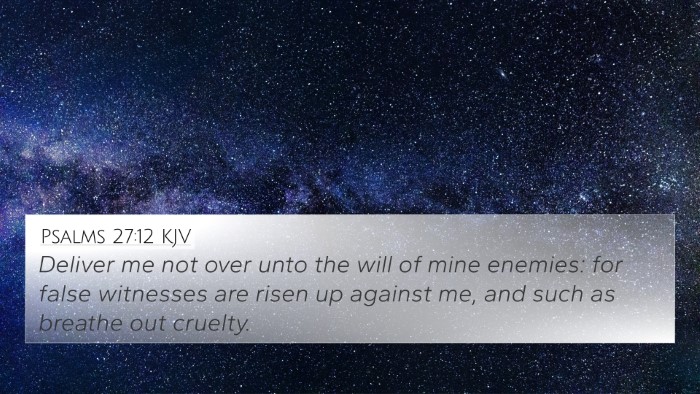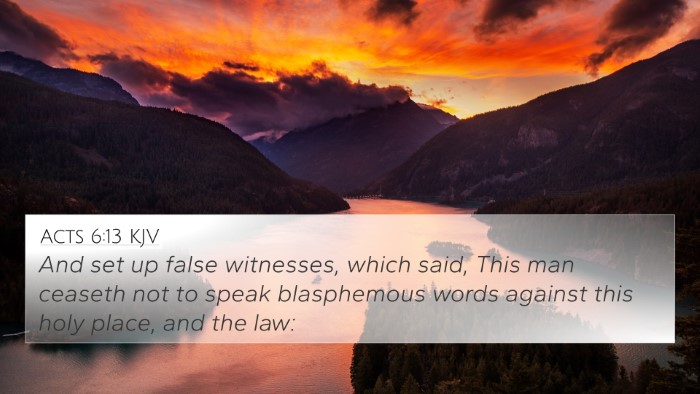Understanding Psalms 35:11
Psalms 35:11 states: "False witnesses did rise up; they laid to my charge things that I knew not." This verse highlights the anguish and distress of the psalmist amidst accusations and deceit, drawing attention to the experience of facing false witnesses who bring unfounded charges against an innocent person.
Summary of Insights
This verse is rich in meaning and significance, encompassing themes of injustice, betrayal, and the quest for divine vindication. The psalmist, often regarded as King David, expresses a heartfelt lament regarding the slander directed towards him by adversaries. Drawing from the insights of public domain commentaries, we can explore the depth of this verse's message.
Commentary Insights
- Matthew Henry: He emphasizes the sorrow of the psalmist who is wrongly accused by individuals who aim to undermine his integrity. Henry reflects on the broader theme of God's justice and how He ultimately defends the righteous against false accusations.
- Albert Barnes: Barnes notes the painful experience of being surrounded by deceitful persons. He highlights the fact that these false witnesses not only speak lies but do so with malicious intent. He suggests that such experiences drive the faithful to seek divine intervention.
- Adam Clarke: Clarke points out that the psalmist's cries are motivated by a deep desire for truth and justice. Clarke also makes a connection to how these allegations can impact one's faith and resolve, illustrating the emotional weight of such betrayal.
Thematic Connections
This verse resonates with various themes found throughout the Bible, particularly regarding injustice, persecution, and the divine response to slander. This connection opens a pathway to explore several biblical passages that share similar sentiments:
- Exodus 20:16: "You shall not bear false witness against your neighbor." This commandment lays the foundation for the importance of truth in interpersonal relationships.
- Psalm 109:2: "For the mouth of the wicked and the mouth of the deceitful have opened against me." Here, the psalmist once again laments the wrongful words directed towards him.
- Proverbs 19:5: "A false witness will not go unpunished, and he who breathes out lies will not escape." This verse asserts the certainty of justice against falsehoods.
- Lamentations 3:66: "Pursue them in anger and destroy them from under the heavens, O Lord!" This plea exemplifies a cry for divine judgment against adversaries who spread lies.
- Matthew 5:11: "Blessed are you when people insult you, persecute you, and falsely say all kinds of evil against you because of me." Here, Jesus addresses the joy of enduring similar slander for the sake of righteousness.
- James 4:11: "Do not speak evil against one another, brothers." This verse encourages upholding truth and refraining from false charges against one another.
- 1 Peter 2:12: "Keep your conduct among the Gentiles honorable, so that when they speak against you as evildoers, they may see your good deeds and glorify God." This highlights the importance of a good reputation amidst false accusations.
Connections Between Bible Verses
The connections between these verses create a tapestry of understanding regarding the experiences to which the psalmist refers. Understanding the connections between Bible verses is vital for grasping the overarching biblical narrative. The act of linking Bible scriptures allows readers to uncover the powerful themes of justice and the human condition.
Comparative Bible Verse Analysis
Through a comparative Bible verse analysis, we can discern how the experiences of the psalmist are reflected in both the Old and New Testaments. For instance, while David faced accusations, Jesus similarly endured slander from His contemporaries. This parallel depicts a consistent theme in scripture, making it essential for individuals studying these texts to engage in scriptural cross-referencing.
Tools for Bible Cross-Referencing
To delve deeper into understanding verses like Psalms 35:11, utilizing tools such as a Bible concordance can facilitate the discovery of Bible cross-references. These resources make it easy to trace themes and consolidate insights relevant to one's studies. Additionally, employing a Bible cross-reference guide can enhance the understanding of the interconnections within biblical texts.
Cross-Referencing Bible Study Methods
Utilizing various cross-referencing Bible study methods can illuminate the significance of a verse. One might start by identifying keywords in Psalms 35:11 like "false witnesses" and using those to find related scriptures. This approach generates a deeper comprehension of its context and application in the life of believers.
Conclusion
Understanding Psalms 35:11 in conjunction with various other scripture verses highlights the broader biblical narratives regarding truth, justice, and the human experience of facing deceit. By employing comprehensive Bible cross-reference materials, individuals can draw insights from biblical texts that illuminate how they relate to one another, enriching their study and understanding of God's Word.









